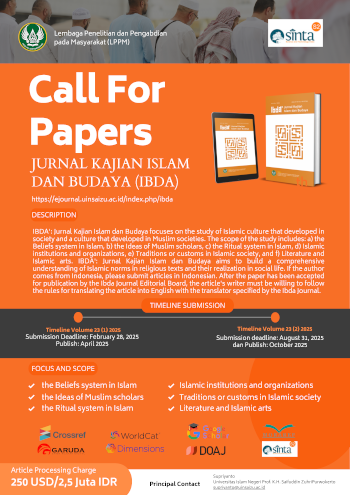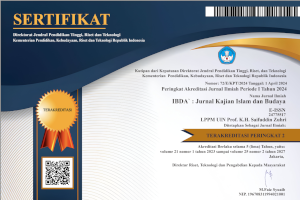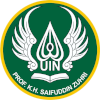THE ISLAMIC CHARACTER VALUES OF KUPATAN TRADITION IN BANGKALAN, MADURA, EAST JAVA
DOI:
https://doi.org/10.24090/ibda.v18i2.3915Keywords:
Value, Character, Islam, kupatan traditionAbstract
Characters are formed in a community through tradition, custom, and cultural activities. A religious tradition called Kupatan has been car- ried out by the Madurese community, especially in Bangkalan, and has been passed down from generation to generation. This study aims to determine the Islamic character values in the Kupatan tradition. The re- sults of this study reveal that the Kupatan tradition could build Islamic character values of the Bangkalan community through various activities in it, namely silaturrahmi, anjang-sana, and almsgiving. The Kupatan tradition is held every year in the month of Shawwal, to be precise after seven days of the Sunnah fast by following the instructions of their an- cestors. Through this tradition, people could increase friendships (main- taining kinship ties) through visits to the houses of family, friends, and fellow community members (silaturrahmi). Silaturrahmi is highly recom- mended in Islam since it could extend life and expand sustenance (rezeki). Besides, the tradition of almsgiving (sedekah), in which all members of the community, both the fortunate and the less fortunate ones, exchange gifts, could also build moral values. The gift-givers should not expect anything in return but the pleasure (ridha) of Allah SWT. The manifesta- tion of Islamic character values in Kupatan could form a community that is religious, responsible, socially and environmentally caring, friendly and communicative, loves the homeland, and is creative.Downloads
Download data is not yet available.
References
Ahmad, A. 2012. “Refleksi Historis Pendidikan Rasulullah Askar Ahmad: Refleksi Historis Pendidikan Rasulullah Potret Untuk Pendidikan Karakter Anak Bangsa†dalam Jurnal Teologia, Volume 23, Nomor 1.
Ambar. 2019. Wawancara tentang Pawai dokar (parade of horse-drawn carriage) and rokat tasek. Bangkalan Madura.
Depdiknas. 2006. Permendiknas No 22 Tahun 2006 Tentang Standar Isi. Jakarta: Depdiknas.
Fathurrohman, P., et. al. 2013. Pengembangan Pendidikan Karakter. Bandung: Refika Aditama.
Gazalba, S. 1976. Masyarakat Islam : Pengantar Sosiologi dan Sosiografi. Jakarta: Bulan Bintang.
Geertz, C. 1983. Abangan Santri dan Masyarakat Jawa. Translated by Aswab Makasin. Pustaka Jaya.
______. 2013. Agama Jawa, Abangan, Santri, Priyayi dalam Kebudayaan Jawa (translated), Ed. Aswab Mahasin dan Bur Rasuanto. Dunia Pustaka.
______. 1960. Religion of Java. New York: Free Press.
Hilmi, M. 1994. Islam and Javanese Acculturation. Master Thesis. Magister of McGill University.
Johansyah. 2011. Pendidikan Karakter Dalam Islam; Kajian Dari Aspek Metodologis. IAIN Ar-Raniry.
Kemendiknas. 2010. Desain Induk Pendidikan Karakter. Jakarta: Kemendiknas.
Kholid, A. (2009). “Agama dan Ritual Slametan Masyarakat Jawa†dalam Jurnal El -Harakah, 11, No. 01-93.
Muslich, M. (2011). Pendidikan karakter: menjawab tantangan krisis multidimensional. Bumi Aksara.
Ningsih, T 2015. Implemetasi pendidikan Karakter. Purwokerto: STAIN Purwokerto Press.
__________. 2019. Tradisi Saparan dalam Budaya Masyarakat Jawa. Kajian Islam dan Budaya Vol. 17, No. 1, May 2019.
Soekanto, S. 2010. Sosiologi Sebagai Suatu Pengantar. Yogyakarta: Raja Grafindo.
Suryadilaga, M. A. 2009. Aplikasi Penelitian Hadis Dari Teks Ke Konteks. Yogyakarta: Teras.
Sztompka, P. 2007. Sosiologi Perubahan Sosial. Jakarta: Prenada Media Grup.
Zubaidi. 2011. Desain Pendidikan Karakter Konsepsi bdan Aplikasinya dalam Lembaga Pendidikan. Jakarta: Kencana Prenada Media Group.
Ambar. 2019. Wawancara tentang Pawai dokar (parade of horse-drawn carriage) and rokat tasek. Bangkalan Madura.
Depdiknas. 2006. Permendiknas No 22 Tahun 2006 Tentang Standar Isi. Jakarta: Depdiknas.
Fathurrohman, P., et. al. 2013. Pengembangan Pendidikan Karakter. Bandung: Refika Aditama.
Gazalba, S. 1976. Masyarakat Islam : Pengantar Sosiologi dan Sosiografi. Jakarta: Bulan Bintang.
Geertz, C. 1983. Abangan Santri dan Masyarakat Jawa. Translated by Aswab Makasin. Pustaka Jaya.
______. 2013. Agama Jawa, Abangan, Santri, Priyayi dalam Kebudayaan Jawa (translated), Ed. Aswab Mahasin dan Bur Rasuanto. Dunia Pustaka.
______. 1960. Religion of Java. New York: Free Press.
Hilmi, M. 1994. Islam and Javanese Acculturation. Master Thesis. Magister of McGill University.
Johansyah. 2011. Pendidikan Karakter Dalam Islam; Kajian Dari Aspek Metodologis. IAIN Ar-Raniry.
Kemendiknas. 2010. Desain Induk Pendidikan Karakter. Jakarta: Kemendiknas.
Kholid, A. (2009). “Agama dan Ritual Slametan Masyarakat Jawa†dalam Jurnal El -Harakah, 11, No. 01-93.
Muslich, M. (2011). Pendidikan karakter: menjawab tantangan krisis multidimensional. Bumi Aksara.
Ningsih, T 2015. Implemetasi pendidikan Karakter. Purwokerto: STAIN Purwokerto Press.
__________. 2019. Tradisi Saparan dalam Budaya Masyarakat Jawa. Kajian Islam dan Budaya Vol. 17, No. 1, May 2019.
Soekanto, S. 2010. Sosiologi Sebagai Suatu Pengantar. Yogyakarta: Raja Grafindo.
Suryadilaga, M. A. 2009. Aplikasi Penelitian Hadis Dari Teks Ke Konteks. Yogyakarta: Teras.
Sztompka, P. 2007. Sosiologi Perubahan Sosial. Jakarta: Prenada Media Grup.
Zubaidi. 2011. Desain Pendidikan Karakter Konsepsi bdan Aplikasinya dalam Lembaga Pendidikan. Jakarta: Kencana Prenada Media Group.
Downloads
Published
2020-11-11
How to Cite
Ningsih, T. (2020). THE ISLAMIC CHARACTER VALUES OF KUPATAN TRADITION IN BANGKALAN, MADURA, EAST JAVA. IBDA` : Jurnal Kajian Islam Dan Budaya, 18(2), 167–181. https://doi.org/10.24090/ibda.v18i2.3915
Issue
Section
Articles
License
Authors who publish with this journal agree to the following terms:
- Authors retain copyright and grant the journal right of first publication with the work simultaneously licensed under a Creative Commons Attribution-ShareAlike License a that allows others to share the work with an acknowledgement of the work's authorship and initial publication in this journal.
- Authors are able to enter into separate, additional contractual arrangements for the non-exclusive distribution of the journal's published version of the work (e.g., post it to an institutional repository or publish it in a book), with an acknowledgment of its initial publication in this journal.
- Authors are permitted and encouraged to post their work online (e.g., in institutional repositories or on their website) before and during the submission process, as it can lead to productive exchanges, as well as earlier and greater citation of published work (See The Effect of Open Access).
















